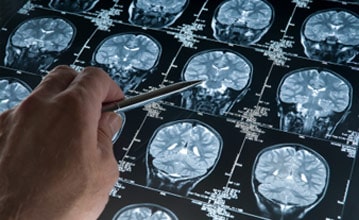Hydrocephalus Testing and Treatment in Northern Virginia
Hydrocephalus is a neurological condition that causes swelling within the deep tissues of the brain. Although there is no way to completely cure hydrocephalus, this medical condition is entirely treatable using a variety of minimally invasive surgical procedures.
Dr. Seth Tuwiner provides comprehensive testing and treatment for hydrocephalus at his office in Leesburg, VA. Learn more about your treatment options and call the Virginia Center for Neuroscience today at (703) 293-5244.
What Causes Hydrocephalus?
Within the brain there are many cavities called ventricles, which normally contain cerebrospinal fluid (CSF). Individuals with hydrocephalus suffer from having too much cerebrospinal fluid in these ventricles, which can lead to swelling and added pressure on the brain.
What are the Symptoms of Hydrocephalus?
Typically, cases of hydrocephalus occur more frequently in newborns and adults over the age of 60. Symptoms of hydrocephalus can vary largely between different age groups, so it is an important distinction to make before reflecting on any symptoms you believe may be related to hydrocephalus.
Infants are likely to exhibit one or more of the following signs if they do in fact have hydrocephalus:
- Unusually large head size
- Extreme fatigue
- Downward deviation of the eyes
- Loss of appetite
- Bulging veins on the scalp
- Increased irritability
- Recurrent vomiting
- Poor muscle development
- A prominent soft spot on the head
- Seizures
In seniors, hydrocephalus will usually present itself in a variety of other symptoms, including:
- Frequent memory loss
- Poor balance
- Difficulty in controlling urges to urinate or other functions of the bladder
- Struggling to lift the feet while walking
- Recurring headaches
- Problems with progressive thinking or decision making
It is also possible for an older child or adult to be diagnosed with hydrocephalus at any point in their life. For those in this middle age group, symptoms typically include:
- Vision impairment
- Frequent urge to urinate
- Headaches
- Weakness and fatigue
- Problems with coordination or balance
- Difficulty concentrating or engaging in activities that require critical thinking
Swelling of the brain can quickly become a serious health issue, which is why anyone exhibiting symptoms of hydrocephalus should seek treatment right away for their symptoms.
Diagnosis and Treatment from Virginia Center for Neuroscience
Hydrocephalus is commonly diagnosed using a combination of physical examination techniques as well as diagnostic imaging tests. Dr. Seth Tuwiner will look for classic signs and symptoms during the patient’s examination, and then an imaging test will be used to definitively confirm or deny a case of hydrocephalus.
Types of scans most often used to investigate conditions of the brain include:
- Magnetic resonance imaging (MRI)
- Computerized tomography (CT)
- Ultrasound
Hydrocephalus Shunt
In order to divert the extra cerebrospinal fluid away from the ventricles of the brain, a shunt may be put into place. A shunt consists of a small, flexible tube that redirects the excess fluid to another area of the body where it can be more easily absorbed, such as the abdomen.
Endoscopic Third Ventriculostomy
Because shunts will need lifelong care and maintenance, patients looking for a more effortless solution may explore other options such as an endoscopic third ventriculostomy. This surgical procedure involves creating a small opening in the third ventricle where the surplus cerebrospinal fluid will be able to drain out on its own without the need for a shunt or any other device.
Choroid Plexus Cauterization
The third hydrocephalus treatment option available to patients in Northern Virginia is known as choroid plexus cauterization. The goal of this procedure is to limit the production of cerebrospinal fluid right away by inflicting a controlled amount of damage on the individual’s choroid plexus tissue, which is the area of the brain where CSF is produced.
Schedule an Appointment at our Leesburg, VA Office Today
Hydrocephalus is a serious condition that should require immediate attention. If you believe you or your child are experiencing symptoms of hydrocephalus, call our office right away at (703) 293-5244.




